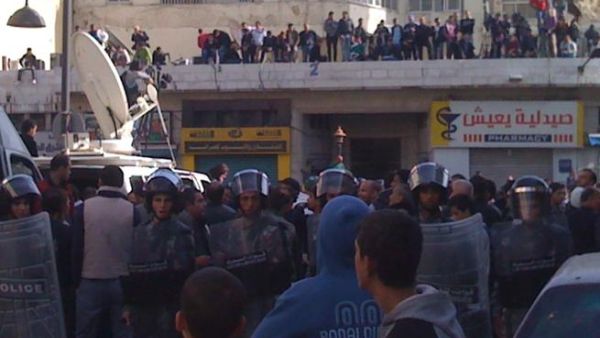At the Friday prayers, the Imam was clearly not on the side of the protestors. The “faithful” grew in number outside the mosque until it was clear: these were not your average prayer group.
Ringing out from the Hussein mosque in downtown Amman, the cleric preached against “causing chaos” in the country. Talking about the recent spate of Arab-Spring-like protests that have hit the sleepy Kingdom, he said:
“Those who do these things threaten the wellbeing of the people. No Muslim would allow this.”
It was not an auspicious start but by the end of the prayer, nearly 2,000 had gathered and the speakers were stationed to begin a different kind of speech.
Maher Bakhee from the Wahdi Shabiya party was one of those out. His members held a sign, which read: “No to increasing prices, yes to prosecuting the corrupt.”
The demonstrations, which began on Tuesday evening, followed a government announcement that fuel prices would rise sharply, in effect immediately.
That night, drivers rushed to gas stations to fill up before midnight and the usually loyal citizens of Jordan took to the streets to have their say.
Maher told us he had attended protests the previous two nights but only as a spectator but this time he was here to chant and sing with the rest of them.
“It’s either going to continue until the regime falls or we’ll change the parliament and get a more democratic one,” he said.
His party is looking for more power to be devolved to the Jordanian parliament so that they can make real changes and crack down on corruption.
An hour into the protest and numbers had swollen to nearly 4,000 with no sign of riot police present. Fatima, one of the many women joining the demonstration, told us she was out because she loved her country, not because she was looking to destroy the regime:
“People used to be afraid,” she said, “but now they’re taking to the streets.”
In the background, the chants rang out: “Abdullah has lost his legitimacy” and “Abdullah is a caterer for the corrupt.” This Friday protest was one of the first to push the point at the King, not the usual Jordanian manner of politely striking at the government, their trusty middle man. Peaceful and yet strident, these activists were giving him an option - 'Stay and change, or step down' - they said directly to their majesty.
Despite the strong language, the protest looked calm until just before 2pm when the loyalists arrived. Many in Jordan believe these people are simply plain-clothes policemen, while other think they are thugs and criminals hired by the secret services.
Around 300 of these loyalist thugs arrived to surround the protestors, at which point the atmosphere changed. As the air grew tense and riot police moved in, a sudden rush on one side of the crowd forced people to run the other way. It was rumored that clashes had happened between loyalists and protestors but no one was able to confirm the story.
We caught up with Fatima Alzaben, an Islamist demonstrator, on the way back outside the mosque. She had been hit with teargas by the police on the previous two days of demonstrations but refused to go home.
“This is not for freedom or for dignity, we just need the prices to go down,” she said.
Women like Fatima made up nearly a tenth of the total protestors and while the loyalists were baying for blood, there were no incidents of violence, at least not in the downtown. The provinces meanwhile had flared up as loyalists clashed with their 'opponents'. But police and army were in tandem to keep the Kingdom's protestors apart, blocking roads into Amman to prevent a tidal wave flooding the capital.
This was no Tahrir moment for Amman but the demonstrations are set to continue this weekend and all eyes are on the King to speak. And when he does, the people who are increasingly frustrated with the monarch's 'good cop-bad cop' routine with his cabinet, expect their intelligence not to be insulted.








